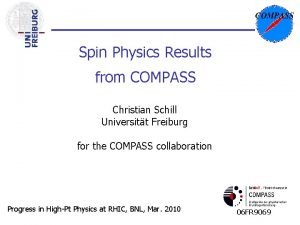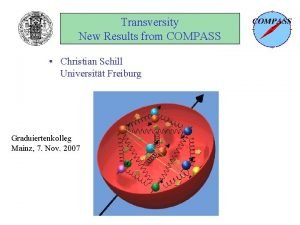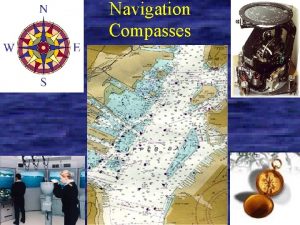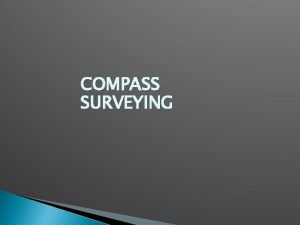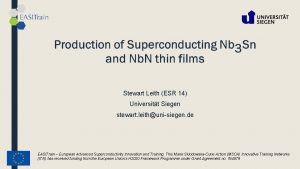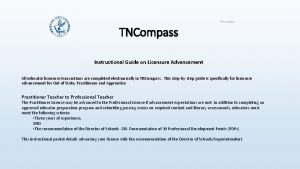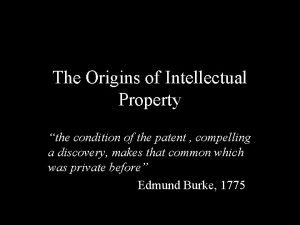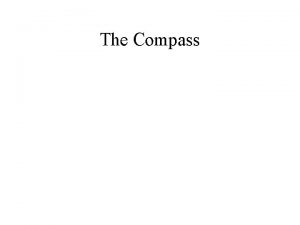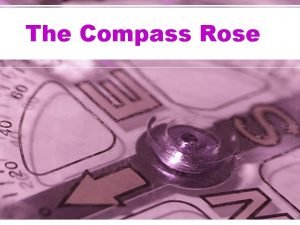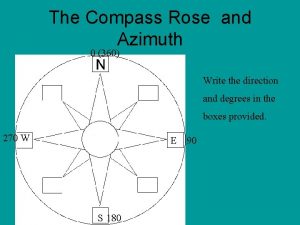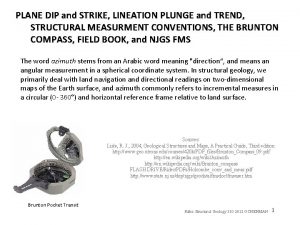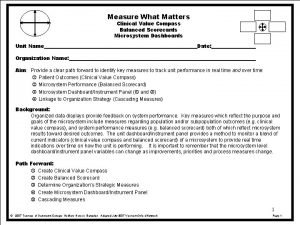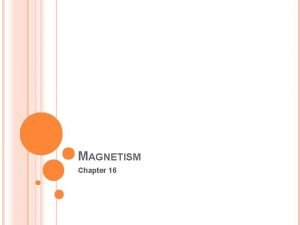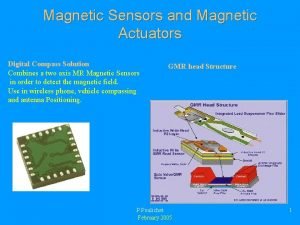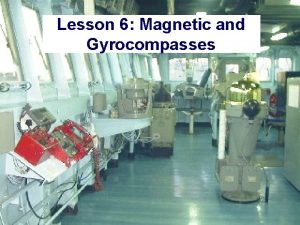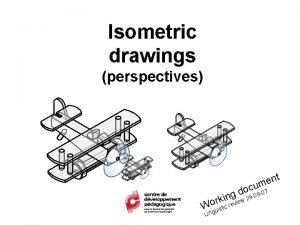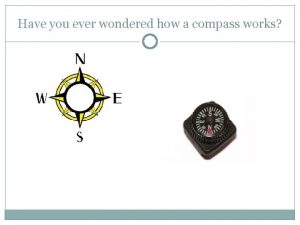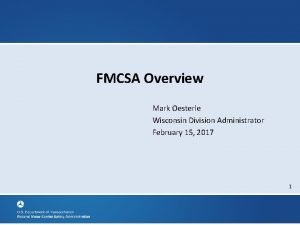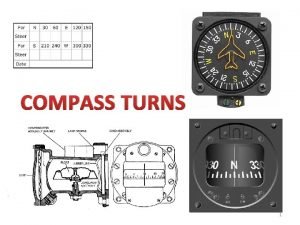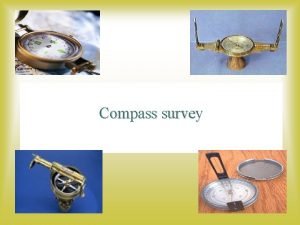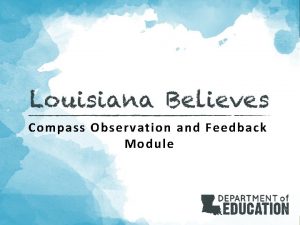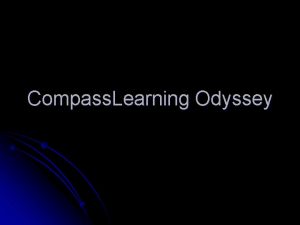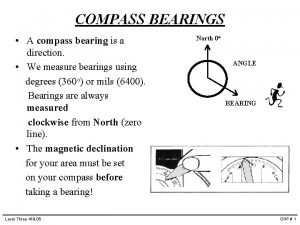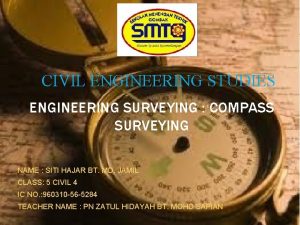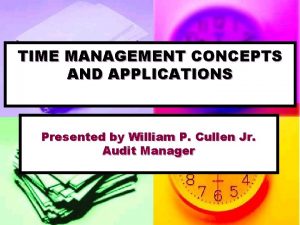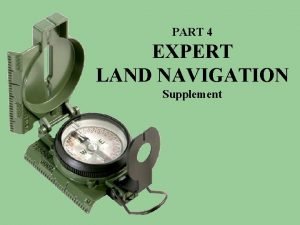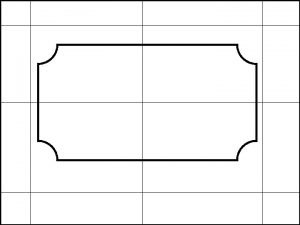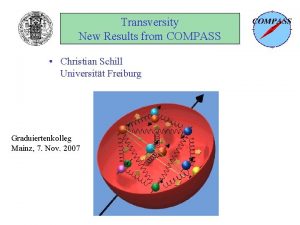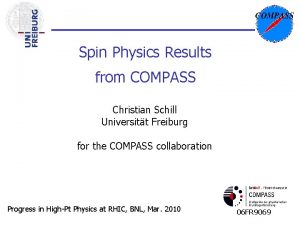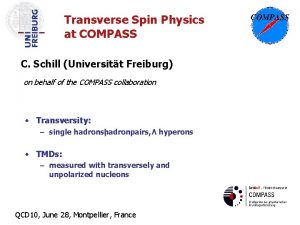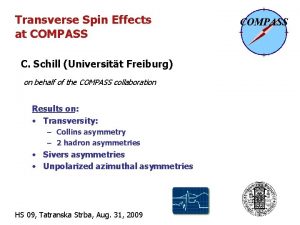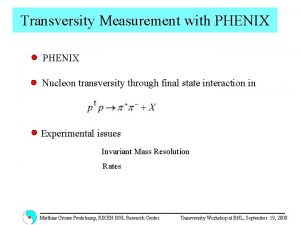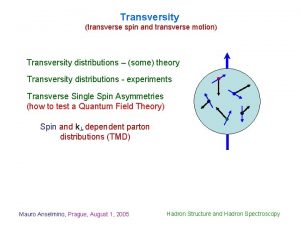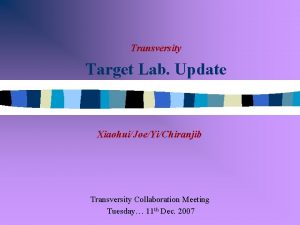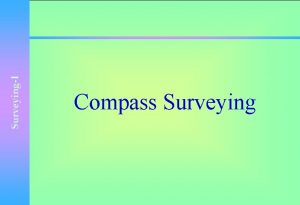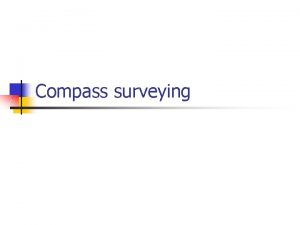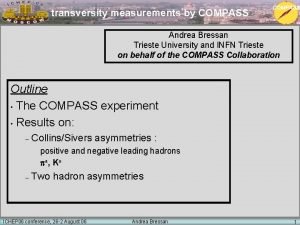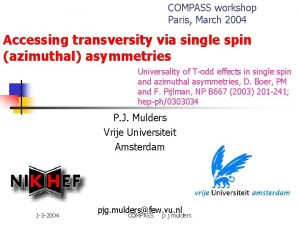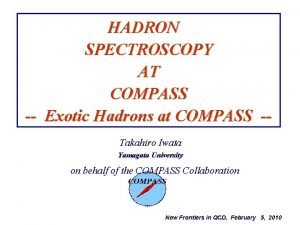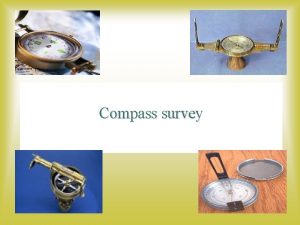Transversity New Results from COMPASS Christian Schill Universitt





























































- Slides: 61

Transversity New Results from COMPASS • Christian Schill Universität Freiburg Graduiertenkolleg Mainz, 7. Nov. 2007

Contents • Introduction: Spin Structure of the Nucleon • The COMPASS experiment • COMPASS results on asymmetries • Transversity distribution function • Sivers distribution function • Other TMD distribution functions • Conclusions

Deep-Inelastic Scattering Q² = negative transferred four-momentum squared • Investigation of the proton structure • 1955 Hofstadter: Radius 0, 8 fm Nobel Prize 1961 • 1968 Friedman, Kendall, Taylor: Quarks in the proton Nobel Prize 1990 • DESY: highest Q² – Quarks and gluons are the elementary constituents

Deep-Inelastic Scattering P inclusive hadrons semi-inclusive scattering: detection of final hadrons y = relative energy loss of scattered lepton Q² = negative four-momentum transfer squared x = Momentum fraction of the proton carried by the quark

Cross-Section in Deep-Inelastic Scattering P inclusive hadrons y = relative energy loss of scattered lepton Q² = negative four-momentum transfer squared x = Momentum fraction of the proton carried by the quark

Structure functions partons are point-like particles quark carries 1/3 of momentum

Structure functions partons are point-like particles parton carries all momentum quark carries 1/3 of momentum x = Fraction of momentum carried by the parton

Structure functions partons are point-like particles parton carries all momentum quark carries 1/3 of momentum x = Fraction of momentum carried by the parton

Structure functions partons are point-like particles parton carries all momentum gluons reduce quark momentum contribution quark carries 1/3 of momentum with sea-quarks x = Fraction of momentum carried by the parton

Structure functions partons are point-like particles parton carries all momentum gluons reduce quark momentum contribution quark carries 1/3 of momentum with sea-quarks x = Fraction of momentum carried by the parton

Structure functions scattering on spin ½ particles Scale invariance scattering on point-like objects • larger Q² – better Resolution – more Gluons and see-quarks x • Q² dependence is described by QCD

Parton Distribution Functions Parton model: Parton Distribution Functions:

Polarized Deep Inelastic Scattering Experimental Asymmetry: g 1: Spin structure function Δqi: Polarized parton distribution function

Polarized Parton Distribution Functions Parton model:

Transverse Spin Physics At leading order, the inner structure of the nucleon can be described with three Parton Distribution Functions: q(x) Momentum distribution Well known – Unpolarized DIS Δq(x) Helicity distribution known – Polarized DIS ΔTq(x) Transversity distribution Largely unknown

Transversity Distribution Function DTq(x) = q↑↑(x) - q↑↓(x) q=uv, dv, qsea quark with spin parallel to the nucleon spin in a transversely polarized nucleon Properties: • probes the relativistic nature of quark dynamics • positivity (Soffer) bound • sum rule for transverse spin Bakker, Leader, Trueman, PRD 70 (04)

How to Measure Transversity? Optical theorem: leptonic hadronic Cross-section of inclusive deepinelastic scattering: * + N X Imaginary part of amplitude of forward Compton scattering: * + N

Structure Functions in Forward Compton Picture + F 1(x) + + + ΔTq(x) + - + - + + + g 1(x) - + + + not possible in inclusive deep-inelastic scattering because of quark helicity flip

Measuring Transversity Only in Semi-inclusive deep-inelastic scattering hadron(s) FF quark DTq(x) proton Measured in COMPASS Fragmentation process into hadrons responsible for quark spin flip

Measuring Transversity Can be measured in semi-inclusive deep-inelastic scattering on a transversely polarized target via “quark polarimetry”: “Collins” asymmetry “Collins” Fragmentation Function Two-hadron asymmetry “Interference” Fragmentation Function Λ polarization Fragmentation Function of q↑ Λ

Collins Fragmentation - Model http: //cerncourier. com/main/article/44/8/19/1 Collins Effect in String Fragmentation (X. Artru)

Collins Fragmentation - Model

Collins Asymmetry SIDIS on a transversely polarized target: l N l´h X Fragmentation of a transversely polarized quark into hadrons azimuthal asymmetry: The Collins angle Coll is defined as:

Collins Asymmetry The measured asymmetry AColl gives access to the transversity distribution times the Collins fragmentation function: f: Dilution factor Dnn: Depolarization factor Dnn=2(1 -y)/(1+(1 -y)2) PT: Target polarization Transversity distribution Collins fragmentation function (measured in e+e- at BELLE)

Contents • Transverse spin physics • The COMPASS experiment • COMPASS results on asymmetries • Transversity distribution function • Sivers distribution function • Other TMD distribution functions • Conclusions

The COMPASS experiment COmmon Muon Proton Apparatus for Structure and Spectroscopy (270 physicists, 25 institutes, 11 countries) Investigation of the spin structure of the nucleon: • high luminosity: ~ 4 ٠ 1032 cm-2 s -1 • fixed target • 160 Ge. V µ+ beam COMPASS LHC SPS

The COMPASS spectrometer μ Filter Calorimeters 50 Ring Imaging Cherenkov detector m Straws MWPC Target am e μb Gems Sci. Fi Drift chambers Micromegas coverage of wide kinematical range: 10 -5 < x < 0. 5 10 -3 < Q 2 < 100 Ge. V 2 Silicon from Germany: FR, MZ, ER, BN, BO, M, BI

The polarized 6 Li. D-Target Vertex distribution: 3 He – 4 He dilution refrigerator Superconducting Dipole (0. 5 T) T=50 m. K Two 60 cm long target cells with opposite polarization Polarization 50 % Dilution factor 0. 38 Transverse target polarization: Reversed once a week

Ring Imaging Cherenkov Detector Identification of π, K and protons Cherenkov thresholds: π ≈ 3 Ge. V/c K ≈ 9 Ge. V/c p ≈ 17 Ge. V/c 3 m 6 m Mirror wall 5 m Cs. I MWPC Radiator: C 4 F 10 2σ π/K separation at 43 Ge. V/c

Transversity Data Sample transversely polarized deuteron target ~ 20% of the running time 2002 11 days of data taking (19), 2003 9 days of data taking (14), 2004 14 days of data taking (24), reconstructed DIS events (10 6 ) 2 periods 1 period trigger (large x, Q 2) + PID (ECAL, RICH) 2 periods 10 Mill. DIS events

Contents • Transverse spin physics • The COMPASS experiment • COMPASS results on asymmetries • Transversity distribution function • Sivers distribution function • Other TMD distribution functions • Conclusions

COMPASS Results: Collins Effect K preliminary only statistical errors shown (systematical errors considerably smaller) Deuteron target

Interpretation • Parton model, valence region: HERMES (DESY): Proton asymmetries 0 BELLE (KEK-B): Fragmentation functions 0 Small asymmetries cancellation ΔTu(x) ≈ - ΔTd(x) isospin-symmetric deuteron target D 1: favored FF D 2: disfavored FF

Collins: Interpretation Global fit (COMPASS, HERMES, BELLE): COMPASS data Anselmino et al. hep-ph/0701006

Collins: Global Fit Global fit (COMPASS, HERMES, BELLE): HERMES data Anselmino et al. hep-ph/0701006

Collins: Global Fit Global fit (COMPASS, HERMES, BELLE): BELLE data Anselmino et al. hep-ph/0701006

Results for Transversity global fit Soffer bound Anselmino et al. hep-ph/0701006

Collins Fragmentation Function Favored and unfavored FF with opposite sign Anselmino et al. hep-ph/0701006

Measuring Transversity Can be measured in semi-inclusive deep-inelastic scattering on a transversely polarized target via “quark polarimetry”: “Collins” asymmetry “Collins” Fragmentation Function Two-hadron asymmetry “Interference” Fragmentation Function Λ polarization Fragmentation Function of q↑ Λ

Transversity in Hadron-Pair Production Collins-Angle replaced by: RS = R + S - π R= angle between lepton scattering plane and two-hadron plane (A. Bacchetta, M. Radici, hep-ph/0407345) (X. Artru, hep-ph/0207309)

Azimuthal Asymmetry for Hadron-Pair Production Target single spin asymmetry ARS(x, z, Mh 2): z=z 1+z 2 (X. Artru, hep-ph/0207309) Two-hadron interference fragmentation function presently unknown can be measured in e+e- (BELLE) expected to depend on the hadron pair invariant mass

Hadron Pairs Invariant Mass Spectra all hadron pairs: 5. 3 M

COMPASS Results for Hadron Pairs systematic uncertainty considerably smaller than statistical error

COMPASS Result for All Hadron Pairs deuteron target

Interpretation Two-hadron Asymmetry: On a deuteron target: Independent measurement from Collins asymmetry with different fragmentation functions. Data suggest as well: ΔTuv(x) = - ΔTdv(x)

Model Calculations ΔTq(x) Model calculations for COMPASS kinematics (M. Radici, QCDN 06, hep-ph/0608037): Model for transversity: ARS Prediction for COMPASS: x. Bj Mh • Soffer, Stratmann, Vogelsang, P. R. D 65 (02) 114024 • Korotkov, Nowak, Oganessian, E. P. J. C 18 (01) 639 • Schweitzer et al. , P. R. D 64 (01) 034013 • Wakamatsu P. L. B 509 (01) 59 è small asymmetries on the deuteron

Model Predictions for a Proton Target COMPASS kinematics Proton Target A. Bacchetta, M. Radici PRD 74(2006)114007 Model for Di-Hadron Fragmentation Function new data on a proton target have been already taken this year!

Contents • Transverse spin physics • The COMPASS experiment • COMPASS results on asymmetries • Transversity distribution function • Sivers distribution function • Other TMD distribution functions • Conclusions

The Sivers Distribution Function most famous transverse momentum transverse nucleon spin dependent parton distribution function describes an intrinsic asymmetry in the parton transverse momentum distribution induced by the nucleon spin x nucleon momentum • it is related to the parton orbital angular momentum in a transversely polarized nucleon quark density M. Burkardt, PRD, 66, 114005(2002)

Measurement of Sivers Asymmetry The “Sivers angle” is S = h - S Independent from Collins angle, possible to measure both effects in the same data h, , s azimuthal angles of the hadron, transverse spin of the initial quark

COMPASS: Sivers Asymmetries K only statistical errors shown (systematical errors considerably smaller)

Interpretation • Parton model, valence region: Small asymmetries suggest Δ 0 Tdv(x) -Δ 0 Tuv(x)

Global Fit: Sivers Asymmetry M. Anselmino et. al hep-ph/0511017

Global Analysis: Sivers function • Extraction of the Sivers function from COMPASS & HERMES: Δ 0 Tq(x) Anselmino et al Collins et al Anselmino et al. hep-ph/0511017

Contents • Transverse spin physics • The COMPASS experiment • COMPASS results on asymmetries • Transversity distribution function • Sivers distribution function • Other TMD distribution functions • Conclusions

Beyond Collins and Sivers Mechanism SIDIS cross-section in one-photon exchange approximation: 8 transverse target spin dependent azimuthal modulations . . . Sivers Collins 6 further modulations -photon flux M. Diehl, S. Sapeta, Eur. Phys. J C 41 (2005) 515 -533 hep-ph/0503023

Results beyond Collins and Sivers all transverse target spin asymmetries on the deuteron ≈ 0

Conclusions • Compass results for Collins effect and Sivers effect on the deuteron • Together with the Collins Fragmentation Function (BELLE) and data on the proton (HERMES+COMPASS 2007): TRANSVERSITY CAN BE MEASURED First global analyses being done

Conclusions • ΔTu(x) > 0 and ΔTd(x) < 0 • Both ΔTu(x) and ΔTd(x) do not saturate Soffer bound • 2007 COMPASS data on a proton target will allow us to determine ΔTu(x) and ΔTd(x) with greater precision!

COMPASS 2007 Proton Transversity Run Data taking just finished, waiting for the first results…

 Christian schill
Christian schill Point like particles
Point like particles Compass least error east
Compass least error east Fore bearing and back bearing
Fore bearing and back bearing Universitt
Universitt Harvard universitt
Harvard universitt Ccc freiburg
Ccc freiburg Universitt wien
Universitt wien New jersey bar laptop program
New jersey bar laptop program Wren njrotc
Wren njrotc Studio compass pdf
Studio compass pdf Tncompass experience verification form
Tncompass experience verification form Taccola's wheel
Taccola's wheel Exploded/cross projection sketch
Exploded/cross projection sketch Crime scene sketches
Crime scene sketches Uses of compasses
Uses of compasses 32 points of compass
32 points of compass Compass rose 360
Compass rose 360 Clinical value compass
Clinical value compass Uac subject compass
Uac subject compass Spot height symbol on a map
Spot height symbol on a map Sbc vote compass
Sbc vote compass Nathanson compass of shame
Nathanson compass of shame Nathanson compass of shame
Nathanson compass of shame Acn compass compensation plan
Acn compass compensation plan Indicated altitude
Indicated altitude Trend plunge
Trend plunge Ny dmv lapse of insurance
Ny dmv lapse of insurance Clinical value compass
Clinical value compass Nne compass bearing
Nne compass bearing What is magnet
What is magnet Hall effect compass
Hall effect compass Can dead man vote twice
Can dead man vote twice Compass slt examples
Compass slt examples Non isometric lines
Non isometric lines Cross projection method sketching
Cross projection method sketching How does a compass work
How does a compass work Lucy langer md compass oncology
Lucy langer md compass oncology Mark edward oesterle
Mark edward oesterle Sketch all serious crime and crash scenes:
Sketch all serious crime and crash scenes: Compass me
Compass me Compass turn
Compass turn Bearing and meridian
Bearing and meridian Compass cave
Compass cave Compass observation
Compass observation Compass rubric louisiana
Compass rubric louisiana Compass learning com odyssey
Compass learning com odyssey Direction and bearing
Direction and bearing Blanbering
Blanbering Tools classification
Tools classification Compass rose with cardinal and intermediate directions
Compass rose with cardinal and intermediate directions Primatic compass
Primatic compass Nathanson compass of shame
Nathanson compass of shame Amaysim acn
Amaysim acn As virtuous men pass mildly away
As virtuous men pass mildly away Topographic map compass
Topographic map compass Time management concepts
Time management concepts Dead reckoning land nav
Dead reckoning land nav Lensatic compass parts
Lensatic compass parts Lensatic compass parts
Lensatic compass parts Louisiana believes compass
Louisiana believes compass Drawing of compass rose
Drawing of compass rose
